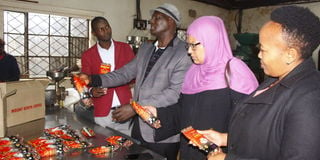Coffee society woos the youth to boost production

Officials from the Kenya Exports Promotion and Branding Agency (Keproba) sample processed coffee at Meru Central Coffee Cooperative Union offices on May 17, 2023.
Muthuri Muriungi, in his 30s, is the newest coffee farmer at Kathera Farmers' Cooperative Society in Meru after his parents allocated him 100 bushes of the plant.
Muriungi joins other aspiring young coffee farmers under an initiative called 'Youth in Coffee' and 'Women in Coffee', which aims to address succession challenges that have affected coffee production for years.
"My father allocated me 100 coffee bushes this week after we received intensive training from the company. According to my calculations, I can earn up to Sh300,000 every year from these trees," said Muriungi.
Ten years ago, the Meru Central Coffee Cooperative Union (MCCCU) started the initiative to recruit women coffee farmers, with great success.
Joseph Kiogora, MCCCU acting chief executive officer, says succession was a major constraint to coffee production and sustainability.
"We realised that the majority of our farmers were getting older and as a result, production was declining sharply. Coffee farming was largely a male affair. We encouraged the men to allocate land or coffee bushes to their wives. The women were then grouped into village savings and loan associations for table banking and knowledge sharing," said Kiogora.
According to the association's secretary, Kirimi Munyua, Kathera's annual production has more than doubled from 200,000 kilos to more than 503,000 kilos last year, thanks to the women farmers.
"When we started encouraging men to plant coffee bushes for their wives, we faced resistance. But we managed to recruit about 300 women. The impact on our society is huge," says Munyua.
He says that following the success of the Women in Coffee initiative, they are now involving the youth to increase production to more than one million kilos a year by 2025.
Speaking during the training of more than 200 youth from Kathera on coffee farming, Eva Muthuri, an exporter, says the initiative aims to develop interest among young people.
The initiative, supported by the GIZ Coffee Innovation Fund, will see the youth forming groups to venture into environmental protection, transportation of coffee and inputs, and promotion of good agricultural practices.

Officials from the Kenya Exports Promotion and Branding Agency (Keproba) sample processed coffee at Meru Central Coffee Cooperative Union offices on May 17, 2023.
"Kathera Society will ensure that they provide jobs in transport, nursery development and other areas to enable them to raise money to venture into coffee farming. Parents will also be encouraged to give their children some coffee plants," says Muthuri.
The success of the Women in Coffee initiative, she says, can be replicated with the youth, who make up 70 per cent of the population.
"Currently, women coffee farmers under Kathera Society earn up to Sh20 million every year," she says.
Patrick Mburugu, treasurer of Kathera FCS, says youth involvement will help increase production per tree from three to 10 kilos.
Bernard Sitati of One Africa Advisory, which is contracted by the GIZ Coffee Innovation Fund, says the involvement of the youth will secure the future of coffee, a major foreign exchange earner for Kenya.
"Kenya supplies only two per cent of Europe's coffee needs. By getting more young people involved in coffee farming, we can increase our exports. We are also encouraging the youth to use technology to advance coffee farming," adds Sitati.
According to the Coffee Directorate, Kenya produced more than 51,000 tonnes of coffee in 2022, up from 34,000 tonnes in 2021.





